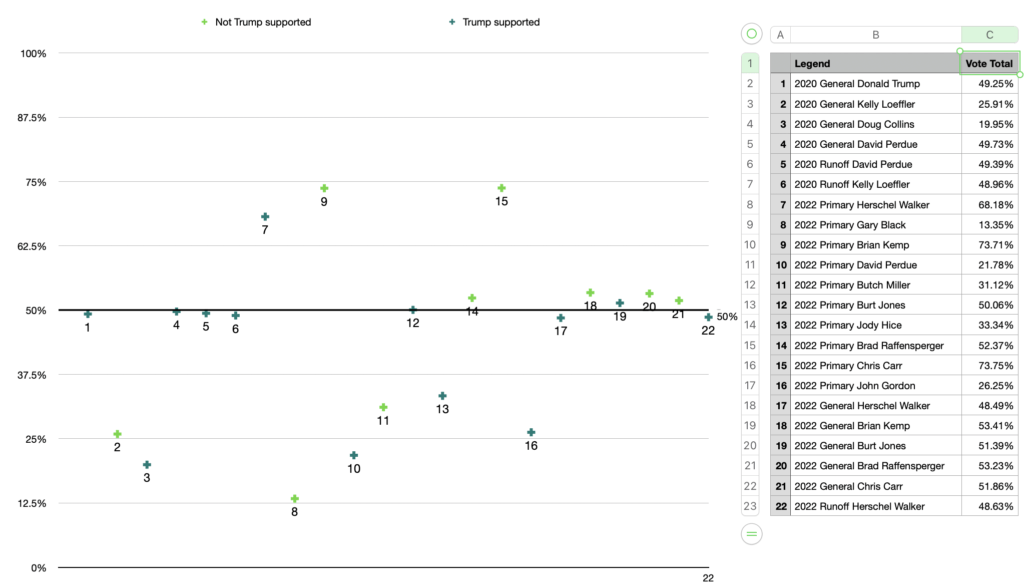One Weird Trick To Determine If Georgia Will Vote Republican
Election season is finally over, and unfortunately for Georgia Republicans, we closed the year out with a loss in the Senate runoff. The internet does not lack for hot takes on exactly why that was; indeed, we have some quality post-election analysis on this very site.
A common theme in the media is that Herschel Walker’s narrow loss to Raphael Warnock proves that Georgia is a swing state. On the surface, this conclusion doesn’t seem unreasonable. After all, Joe Biden won Georgia in 2020, the first time a Democratic candidate for President has done so since 1992. And we also elected two Democrats to the U.S. senate that year, after another contentious runoff.
But you have to ignore a lot of contradictory data to be comfortable making that claim. In the general election, Brian Kemp defeated Stacey Abrams by nearly eight percentage points, a huge margin for a supposed swing state. Except for Walker, all other statewide GOP candidates won their races by similar margins. Republicans picked up a House seat (although redistricting helped here) and maintained control of both state legislative houses.
Even going back to 2020, both Donald Trump and David Perdue lost their races by the slimmest of margins, and Republicans won the majority of U.S. House seats as well as the state legislature and the Public Service Commission. Outside of the Presidency and Senate, Republicans have continued to dominate Georgia elections in the past two cycles just as they have since the mid-2000s*.
So if Georgia isn’t a swing state, how do we explain losing Senate races three times in two years, on top of Biden’s win in Georgia? The majority of our voters may be conservative, but they’re not Yellow Dog Republicans. There aren’t enough Georgians who exclusively vote Team Red or Team Blue to carry the state. An individual candidate has to appeal to Georgia voters to win the middle.
I’m a big fan of data-driven analysis. One reason I was asked to write for this site was a collection of posts I made to Facebook during COVID in which I tracked the raw data reported to the state and graphed it in ways I thought were more useful and relevant than what the state was providing (and a surprising number of elected officials have since told me they found my charts more useful than the official Department of Public Health info).
So my hypothesis is that if there’s a metric that highly correlates with some Republicans winning and others losing over the past two cycles, it’s very likely that metric will be predictive of which Republican candidates will have success here in the future. And, as it happens, there is such a metric that’s both highly correlative and likely to be somewhat controversial (which is good for clicks, I guess).
I plotted the vote percentages of each Trump-supported GOP candidate, as well as the top vote-getting GOP candidate not backed by Trump, for each election in the 2020 and 2022 cycles, using data from the Georgia Secretary of State’s web site. The resulting graph is below.

As you can see, Trump-endorsed candidates broke the needed 50% mark in just 3 out of 13 of those elections (23%), whereas the candidates not supported by Trump won a majority in 6 out of 9 races (67%). Additionally, one of the 2020 Senate races was a special election to fill the seat of the retiring Johnny Isakson, which made the general election a “jungle primary” in which Kelly Loeffler advanced to a runoff by outpolling Trump-backed Doug Collins 26%-20%. This gives the candidates not endorsed by Trump an overall success rate of 7/9, or 78%.
Among 22 GOP candidates in the past five primary, general, and runoff elections in Georgia, candidates not backed by Trump were more than three times likelier to win than Trump-endorsed candidates. Could any other factor explain that difference? It would be difficult to argue that the candidates articulated any substantially different policy positions. One could look at how much the campaigns spent, but then one would just have to ask why Trump’s candidates had less money than others (particularly considering Trump himself has a substantial war chest raised for, but largely not spent on, supporting his candidates). If there’s another obvious distinction between these two groups of candidates, I can’t find it.
Along with what these data say, I also want to highlight what they do not say. This does not show that any of our candidates are anti-Trump, nor does it show that Georgia voters are anti-Trump. Indeed, Trump’s loss was by a narrower margin than almost any of the candidates he supported who lost. But it does show that, when Republicans are considering which candidates are most able to win office in Georgia, they would be wise to consider that the attributes Trump looks for in a candidate are not the attributes that win elections here, and vote accordingly.
*-This is also a fairly inarguable disproof of the theory that Georgia’s election results were altered due to widespread fraud by the Democrats.
